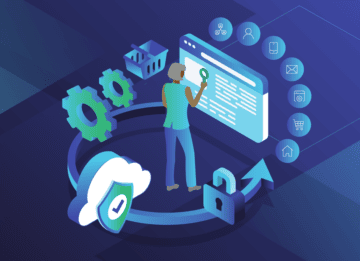
How people and brands can take back their data—and their relationships
People want to be in control of their data. They want to control when and to whom they extend permission to use their data.
Brands want to be in control, too. They want to control their customers’ experiences and the relationship they build with these people.
But most people don’t think about the reality of how every email opened, every browser session, and every transaction provides a personal view into our lives. We assume that when we interact with a company, they use our information to better serve us.
It isn’t always clear that a third-party might be in the middle of that relationship. A company other than the one we’re explicitly interacting with may be capturing all of our personal data exhaust.
And this puts that third-party in control—not the brand we’re interacting with. Too often as customers, we don’t even know that a third party is involved at all, and that’s troubling.
Companies are facing new challenges with data privacy, too.
Regulatory restrictions that govern how you can use data continue to grow and evolve. Plus, platforms and technologies, like the infamous walled gardens and other third-parties, continue to add restrictions around what data businesses can collect (keeping a lot of the details to themselves).
It’s only going to get more complicated in the future—for people and brands.
So, what’s the path forward?
Put control of data back where it belongs
The martech and adtech worlds often see two extremes when presented with this challenge:
-
- “Burn it all down. Everything’s broken. We have to start over.”
- “Nothing will change. There have always been privacy concerns, but nothing’s changed much thus far, and it never will.”
Neither extreme is realistic. Things should change, but we don’t need to burn everything down.
We believe the most reliable and responsible path forward is to give control back to the brands and their customers. Brands and the people that buy from them should own both their data and their relationships with each other.
What, exactly, does that look like?
People should be able to tell brands what data points they can use and which they cannot. And brands should be able to easily manage and respect these wishes in their marketing and advertising to build trust and strengthen relationships.
The technology exists to bring this vision to life.
Qonsent and FullContact partner on data privacy
Our new partnership with Qonsent creates a solution that allows people and brands to take back ownership of their data and the customer experience
Qonsent provides a data privacy platform that lets people manage permissions around what personal data brands are allowed to use when selling to them. The platform also provides brands a mechanism to manage consumers’ requests for how this data is used and engage them accordingly.
Consumers can approve, deny, or revoke this consent at any time.
Qonsent’s application now integrates FullContact’s identity platform to ensure the brand is collecting and managing these permissions at the person level. Our platform verifies the person and protects sensitive data, while still allowing the brand to engage with customers through marketing.
For example, if John tells Acme Corp. not to sell any of the first-party data they’ve collected about him, he probably expects that to apply to all of his email addresses and other identifiers—not just one of them.
The platform also helps to verify John’s identity, protecting him from fraud, while securing and encrypting any data Acme Corp. collects about him. Integrated identity resolution simultaneously helps Acme Corp to ensure compliance through other marketing and advertising platforms.
It’s all about an easy exchange of value
While people want control of their data, they also have finite attention and a lot of things competing for that attention.
People will only manage their privacy preferences if:
-
- A fair value is exchanged
- The tools are easy and convenient
Privacy in practice is when we extend a small portion of our personal space to a brand for the appropriate value in return.
If you give people value, they extend a bit of their personal space to your brand and take a little more control and ownership of the brand-customer relationship—but only if the tools are easy to use.
Our partnership with Qonsent arms companies with tools that will enable both the value exchange and the ability for individuals to consent to the relationship. The technology ensures that while people enter into the economic relationship and value exchange willingly and explicitly, each individual gets to engage on their own terms.
What are the benefits?
The primary benefit of taking a new approach to consent is cutting out the middleman. People and brands no longer have to cede their data to a third party in the middle of the interaction.
Giving brands and consumers the right tools to manage their relationships directly puts the power back in their hands.
In addition, people can trust that:
-
- Their data is only being used in ways they’re given permission for—not being sold for profit.
- No one is fraudulently using their identity.
- Their data is encrypted and secure.
- Brands they love won’t accidentally leak data to companies they know nothing about.
What do marketers get out of this deal?
Allowing customers to manage their relationships with your brand through a platforms like Qonsent + FullContact:
-
- Reduces risk of not complying with the multitude of privacy laws.
- Reduces risk of not complying with the wishes of your customers (which may ultimately cost you business).
- Reduces risk of managing sensitive identity data.
- Simplifies consent and permissions. This is not a simple challenge, but you can make use of simple, convenient tools to address it. Using an API-based makes it easy to manage consent across any first-party data platforms you’re using—and you don’t even have to worry about handling sensitive data (we do that for you).
- Future proofs your marketing by strengthening the first-party data assets you’ve already collected—and ensuring you can use them to improve the customer experience.
A brave new (marketing) world
We will continue to see:
-
- Changing consumer behavior and expectations
- An evolving patchwork quilt of privacy legislation and dual enforcement
- Increasing identifier deprecation
All sorts of disruptions will continue to pummel the marketing and advertising space.
The question is, how will your brand respond?
Will you burn it all down? Stick your head in the sand and hope for the best? Or perhaps, take a bold new step forward and rebuild strong, first-party relationships with your customers?
The choice is up to you—but we recommend building those customer relationships.
Recent Blogs
-
 February 25, 2025 Introducing Email Signals: Unlock Powerful Email Engagement Insights Customer 360, Customer Experience, Marketing & Sales, Enrich API
February 25, 2025 Introducing Email Signals: Unlock Powerful Email Engagement Insights Customer 360, Customer Experience, Marketing & Sales, Enrich API -
 August 28, 2024 The Sales Rep's Guide to Maximizing Productivity with Website Visitor Data Acumen, Media Personalization, Marketing & Sales
August 28, 2024 The Sales Rep's Guide to Maximizing Productivity with Website Visitor Data Acumen, Media Personalization, Marketing & Sales -
 August 6, 2024 Turn Visitors into Leads: How to Install the Acumen Web Tag in 5 Easy Steps Acumen, Website Recognition
August 6, 2024 Turn Visitors into Leads: How to Install the Acumen Web Tag in 5 Easy Steps Acumen, Website Recognition